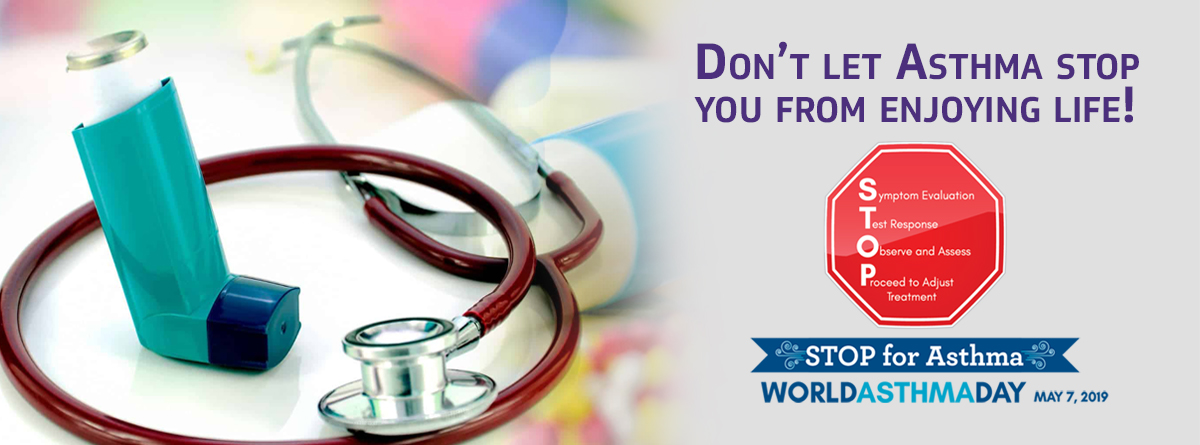
The World Asthma day is celebrated on 7th of May every year, and this year the theme is “STOP for Asthma”. Where STOP means:
S – Symptom Evaluation
T – Test Response
O – Observe and Assess
P – Proceed to Adjust Treatment
Many parents of children suffering from asthma end up with poorly controlled asthma due to myths and many doubts that are often not addressed in busy clinics and hospitals due to lack of time. We are addressing some of the issues which are frequently asked by many parents:
What is Asthma?
Asthma is a disease of the airways in the lungs, wherein the airways become swollen, narrow and sensitive to irritants, which leads to recurrent attacks of cough, breathlessness, noisy breathing and chest discomfort. The number of cases has been increasing considering the changes in lifestyle and environment. Diagnosis of asthma in children under age 5 can be challenging as the symptoms may indicate other conditions. With older children, Pulmonary function tests that measure how well the lungs work can be done.
Why do children suffer from Asthma?
Children who have inherited a genetic predisposition, and exposed to inducers in the environment develop inflammation of airways, the hallmark of asthma. The most common trigger of asthma in children is cold, apart from dust, pollen, smoke and other irritants including air pollutants.
How can we recognize if my child is at higher risk of Asthma?
A family history of allergy and asthma is a predominant risk factor. If one parent has allergies or asthma, the risk of the child developing asthma is approximately 50%, while if both the parents have allergies and or asthma the risk of the child developing asthma is 75%.
Which allergens should be avoided?
|
Indoor allergens Black Mold Dust Mites Cat and dog dander Smoke- tobacco, cooking |
Outdoor allergens Pollen Smoke- Automobile exhaust |
What foods should be avoided by an asthmatic child?
Generally avoiding the food items called as “cold” items, like some fruits, is not advisable. Rarely a child can be allergic to certain foods, such as milk, eggs, peanuts, tree nuts, soy, wheat, fish and shellfish, and food additives.
Does my child need allergy testing?
In general, in day to day practice, allergy testing does not add much to the lines of management.
Can an air cleaner help my child’s asthma?
It is not as effective in removing smaller particles such as dust and pollen. A HEPA (high-efficiency particulate air) filter has been proven to be effective in decreasing pet dander.
My child becomes breathless after running. Should he/she avoid games?
Children suffering from exercise-induced asthma (EIA) develop asthma symptoms after activities such as running, swimming, or biking. Post-exercise, the time varies from 5-20 minutes before the symptoms appear. However, with the proper medications, kids with EIA can usually play sports without a problem. Control your asthma not exercise.
What are asthma relievers and controllers?
Controllers are medicines that reduce inflammation in asthma, that work by reducing the swelling in the airways. The most effective of them being steroids. These medicines help to reduce the severity of asthma if taken regularly as instructed. However, they must be taken regularly, even if your child is not wheezing. Relievers are airway openers that act by dilating the narrowed bronchi and provide rapid relief. They are also known as bronchodilators. They only relieve symptoms but not airway inflammation. We must use controllers for long term and relievers for short term, and not vice versa.
Should I use nebulizer or inhaler?
Metered dose inhalers (MDI) with spacers are preferred over nebulizers. Using nebulizer only for symptomatic relief and not taking long term medications is not advisable by the doctor.
What is a spacer and is it necessary to use it?
A spacer is a device that is attached to the MDI and it holds the burst of medication. This helps the child to breathe the medication into his lungs at his own pace. Spacers are recommended in children due to increased amount of drug delivery.
Why steroids?
Steroids are the most effective anti-inflammatory medicines. They are safe in mild to moderate doses which most asthmatics use. Inhaled steroids are the best way to manage infants with asthma. Depending on your child’s age, you may use inhaled asthma drugs via MDI with a spacer. You need a mask in children younger than three years.
How do I know if my child’s asthma has been controlled? Should my child take asthma medications even though he/she is feeling better?
Children start to feel better with relievers and short duration of controller medications. This makes the parents feel that they are “cured,” while on the contrary, inflammation still remains in the airways. The parents should follow instructions of the paediatrician and continue the controllers which are slowly stepped down and finally stopped. They should not abruptly stop medications. In older children, paediatricians advise pulmonary function tests before stopping the controllers.
How should I talk to people at my child’s school about asthma?
It’s important that your child’s teachers, coaches, and school nurses know about his or her asthma. Talk to your doctor about the best way to handle these discussions. Make sure that your child has an “asthma action plan” and the proper medication at school with detailed instructions that include the location of the medicine or permission for your child to carry it. Ask your child’s doctor to help you personalize this plan based on your child’s asthma and treatment.
What are the main goals of treating my child’s asthma?
The goals of asthma treatment for your child are:
Your child should be able to-
Live an active life, engage in activities without restrictions
Attend school every day
Is free of any breathing difficulties during the night
Use medications to control asthma with minimal or no side effects
If your child is suffering from asthma and you are looking for an expert advice, you should meet a Pediatrician at RxDx Multispeciality Clinic. They have expertise in treating asthma and other lung related diseases in children.
About The Author
Prof. Dr Subramanya N K– BOT (AIOTA Certified), RxDx.
For further details, please contact: 080-49261111, 6745-8111
Download RxDx Smart Healthcare App Now!!!



